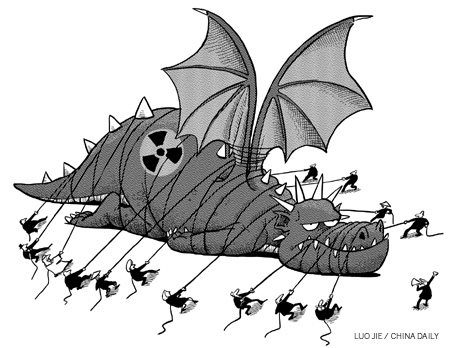Op-Ed Contributors
This is not end of nuke power
Updated: 2011-04-19 08:57
By Pierre Gadonneix (China Daily)

The world is holding its breath, waiting for the latest news from Japan, and hoping that there will be a "happy ending" to what has become a nightmare for the country. Japan is struggling with a triple tragedy: the earthquake, the tsunami and the nuclear accident. With Japan recently raising the Fukushima Daiichi nuclear power plant accident to a level 7 incident, there will be much to learn from these most testing of circumstances.
|
||||
Rather, the Fukushima crisis reminds us that the world needs a range of energy sources to sustain global economic development. Energy demand is expected to double by 2050, and we will need to halve our emissions during the same period. Only with a balance of supply can we enhance national well-being, fight poverty, address climate change and meet this target. With Japan suffering the additional trauma of energy shortage, we are reminded that the answer to the crisis is not to simply switch off nuclear power supply.
One year after the accident at the oil platform in the Gulf of Mexico and the resultant environmental disaster, we recognize that all sources of energy carry a certain level of inherent risk. Be it coal mining, oil drilling, unconventional gas extraction or dams, our efforts must be combined to enhance safety and protect the environment. We need to further improve the way we exploit our existing sources of energy and increase our drive to find and develop new, safe and clean sources of energy.
As we move forward we must look deeply and frankly into the question of safety systems and how nuclear power is organized worldwide. The current situation, in which national bodies look to administer international safety guidelines, allows for too much variance between countries. We need to foster stronger national bodies which are independent, transparent and competent safety authorities staffed with highly skilled experts who enjoy public trust.
E-paper

Han me downs
Traditional 3,000-year-old clothes are making a comeback.
Reaching out
Fast growth fuels rise in super rich
Chinese tourists spend more
Specials

Big spenders
More mainland tourists are expected to spend money on overseas travel this year.

Rise in super rich
Report cites rising property prices, gdp as key drivers of increasing number of chinese millionaires.

Reaching out
Condom makers are stepping up their presence in smaller cities to boost sales




